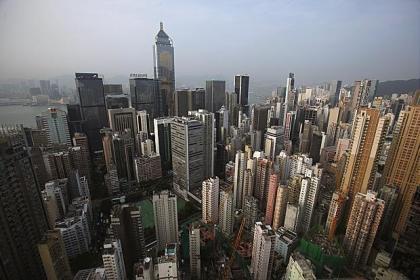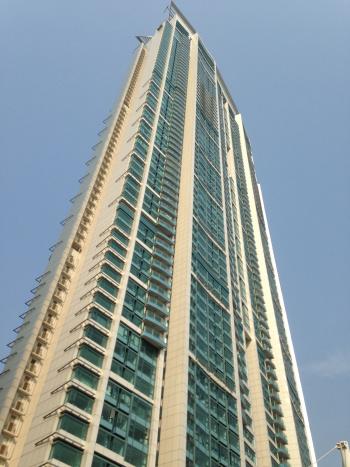
There was a chill in the air at our house last week.
40 floors up, we were enjoying a lazy Sunday afternoon – while two towers along, a woman murdered her partner, before plunging to her death from the 77th floor.
I know. It’s high.
She landed in the swimming pool…
Dragged out by a lifeguard, you can bet, it was a day on the job he’ll never forget.
The lifeguards, that for 364 days of the year, barely get their feathers ruffled by anything more taxing than how many towels to give you.
It was a warm spring day, not far from the pool, BBQ areas were in full swing as residents soaked up the sun, oblivious to the drama that prevailed….that is until the word got out.
The driveway was bumper to bumper with ambulances, fire engines and police cars and the sky above was swarming with media choppers and paparazzi. (And no, despite the media frenzy going on outside our door, we may as well have been on the moon, we were still none the wiser.)
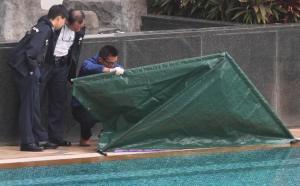
Image Source: South China Morning Post
This week though, if there was a water cooler in the apartment block, it’s a sure bet, residents would’ve been huddled around it, fishing for clues.
Clues as to how it came to this. How a wealthy couple in the prime of their lives with young children could end up splashed across the front page of newspapers, another gruesome statistic.
The story goes something like this: just after 1pm the 47-year-old businesswoman had come down in the lift from her top floor penthouse to the ground floor lobby, covered in blood – asking for help.
Ashen-faced concierge staff immediately called police, but when emergency services reached the top floor, they had to knock the door down.
As they entered, she jumped.
Two months ago she discovered her tycoon-lover of a decade and mother to one of her children was having an affair. She sedated him, then stabbed him 100 times with three different knives.
Both her children were at a birthday party in the complex with their domestic helper.
It’s a spine-chilling story.
Even sadder, high-rise suicides happen in Hong Kong, on average, three times a day. Yes. Three. Times. A. Day!
Shocking but maybe not so surprising.
This is a city where 8000 high-rises dominate the landscape. In fact, more people in Hong Kong live or work above the 14th floor than anywhere else on earth, making it the world’s most vertical city.
Thankfully no one else was injured by her fall…it wouldn’t have been the first time someone was in the wrong place at the wrong time.
In the last couple of years, a 59 year old man jumped to his death from the 19th floor of an apartment building, killing an elderly man….and a Hong Kong policeman was seriously injured when an 81 year old woman jumped, landing on top of him.
The World Health Organisation estimates, globally, there are one million suicides a year – asian countries account for 60 per cent of these.
It’s a sensitive topic no matter where you are in the world but unfortunately, in Asia, there’s a mismatch between the scale of the problem and the resources available to tackle it.
In Australia, the media generally doesn’t report on suicides for fear of copy cats. It’s the subject of serious debate. Some say ignoring suicide only reinforces the silence and the shame.
In Hong Kong, where suicides are given plenty of media-attention, it’s been suggested the way they’re reported could have a significant impact on the number of deaths, by glorifying and sensationalising suicide.
Since 1997 the city has experienced one of the most drastic changes in suicide rates — from 12.5 per cent in 1997 to an historical high of 18.6 per cent in 2003.
It now stands at 13.5 per cent, still higher than the US, Britain and Australia.
It’s sparked widespread social media debate on Hong Kong’s social dislocation, inequality, poverty, poor parenting and internet addiction.
While the death of the woman in our building appears to be over a love tryst, unlike in western countries, the proportion of women committing suicide is higher than the number of men.
On the one hand, women have more opportunities than in many other countries and there are many prominent female leaders, but on the other hand, it’s still a very conservative, traditional society, where gender stereotyping is common.
Family dispute is thought to be a precipitating factor for suicide among many women…and all too often it’s the children who are caught in the middle.
In 2010, a mother threw her four-year-old daughter off the 7th floor in a shopping mall and jumped to her death after quarreling with her husband at a restaurant.
The daughter was saved by the mall’s safety net and survived unharmed, her mom died instantly.
Another four-year-old girl was tightly embraced by her mother as she jumped off the 17th-floor of her apartment.
Ironically, as I write this post, my husband has received a late night call from hotel staff about a frantic woman yelling at the top of her voice in the hotel lobby. She has called police to the hotel exclaiming a male guest (her estranged husband) is staying in a room with their young daughter and she believes he’s suicidal.
That could, of course, happen anywhere and it does but after last week’s string of local murders (four) and suicides, questions are being asked. A local newspaper ran a poll asking: Do you think the recent spate of gruesome murders within families signals a crisis in Hong Kong’s family values?
75 per cent of respondents said yes.
Asian countries have traditionally been characterized by the dominance of the extended family system, meaning individual interests are generally secondary to those of kinship or family.
But as things rapidly progress and modernize, there’s a feeling Hong Kong society is struggling to keep up – with communities facing excessive anxiety and stress.
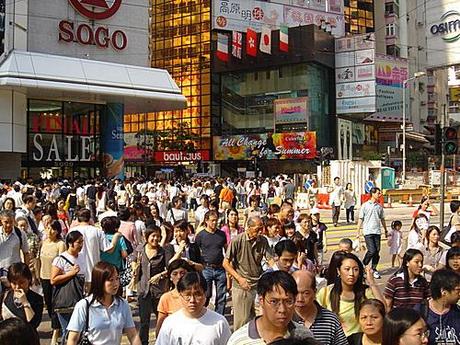
Image Source: Google Earth
In Western countries typical risk factors for suicide include mental disorders, alcohol-related disorders, and often previous history of suicide attempt, but in Asia, moves towards the nuclear family, the rise of single-parent families, more women in paid work, the heavy pressure on children at school and the rapidly rising proportion of elderly people are major contributors to suicide rates.
There’s been a marked rise in what they call ‘familicide-suicide’ where a family commits suicide together. It’s often perpetrated by the male head of the house.
More often than not it’s over a lost job. His.
Hong Kong might be one of the richest cities in the world, but underneath its glittering skyline, almost a fifth of the population is now living in poverty.
It can be tough for young people to establish themselves, housing is extortionate and many end up living with their parents long after they’re married.
It’s not customary for Chinese people to talk about their problems or air their family’s ‘dirty laundry.’ It’s a society where ‘saving face’ is paramount.
Social status, dignity, honor, pride, even trustworthiness depends on it.
Chinese take it so seriously, they will avoid losing face at any cost.
In the last decade, charcoal-burning suicide has become widespread, mainly because it makes a suicide-pact easier to carry out.
One of the four murder-suicides last week involved a couple who was found dead beside a tray of charcoal ash.
The media has come under fire for glamorizing charcoal burning and in a bid to stem the rise of suicides this way, Hong Kong’s government has replaced many traditional countryside charcoal BBQ’s with electric grills and charcoal bags now promote the message “Treasure Your Life, Seek Help.”
The changing nature of the ‘family’ hasn’t eased the burden on Hong Kong’s elderly, who are the largest group to commit suicide. Often triggered by depression, many are poor and live alone in old buildings with inadequate living conditions.
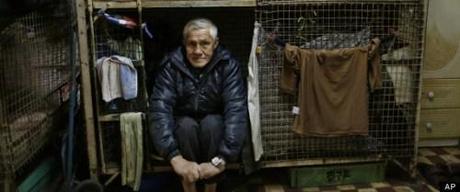
Image Source: AP
In 20 years’ time, one in every four Hong Kong residents will be 65 or above.
There’s also been a significant rise in teenage suicides connected to academic stress.
Five young people took their own lives last month – pointing the finger squarely at Hong Kong’s merciless quest for educational excellence.
A survey found that 54 per cent of Form Three and 72 per cent of Form Six students go for extra tuition after school, finishing so late that there is no room for relaxation, socialising or any other interests.
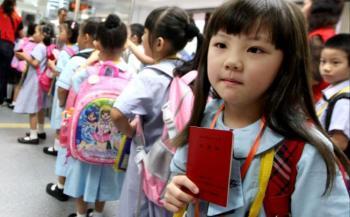
Image Source: SCMP
It’s all par for the course in Asia where the culture of success means the academic treadmill starts well before you can even talk.
It’s a society that views academic performance as the major baseline between success and failure.
Each year, from September to November, there’s a dramatic spike in teen suicide rates, when a new semester begins and crucial exams follow.
A psychologist for Children’s Mental Health in Hong Kong says ‘vengeful’ suicide is common among teenagers. ”They want to get back at those who they believe have caused them misery – usually their parents.”
Hong Kong’s leader. Chief Executive CY Leung this week called on the public to seek help for their problems and not resort to violence, saying, like other Hong Kong people, he is saddened by the spate of murder and suicide cases in the city in recent days.
He said the Government will continue to implement family-friendly policies and render assistance to those in crisis to help prevent domestic violence.
There’s no doubt Hong Kong’s high-pressure culture is taking its toll on citizens.
This fragrant harbor is in a unique position where east meets west and the challenge moving forward lies in balancing a modernized way of life with traditional Chinese practices.
“The most fatal thing a man can do is try to stand alone.” “Remember, the change you want to see in the world, and in your school, begins with you.” Joseph Clementi
One life lost, is one too many.
*******
If you or someone you know needs help, contact the following:
Family Caritas Crisis: 18288
The Samaritans: 2896 0000
Samaritan Befrienders: 2389 2222
Suicide Crisis Intervention Centre: 2319 1177 (Mon to Fri: (9am to 1pm, 2pm to 6pm)
Social Welfare Department Hotline: 2343 2255
Suicide Prevention Services: 23820000
The Mental Health Association of Hong Kong: 27720047
